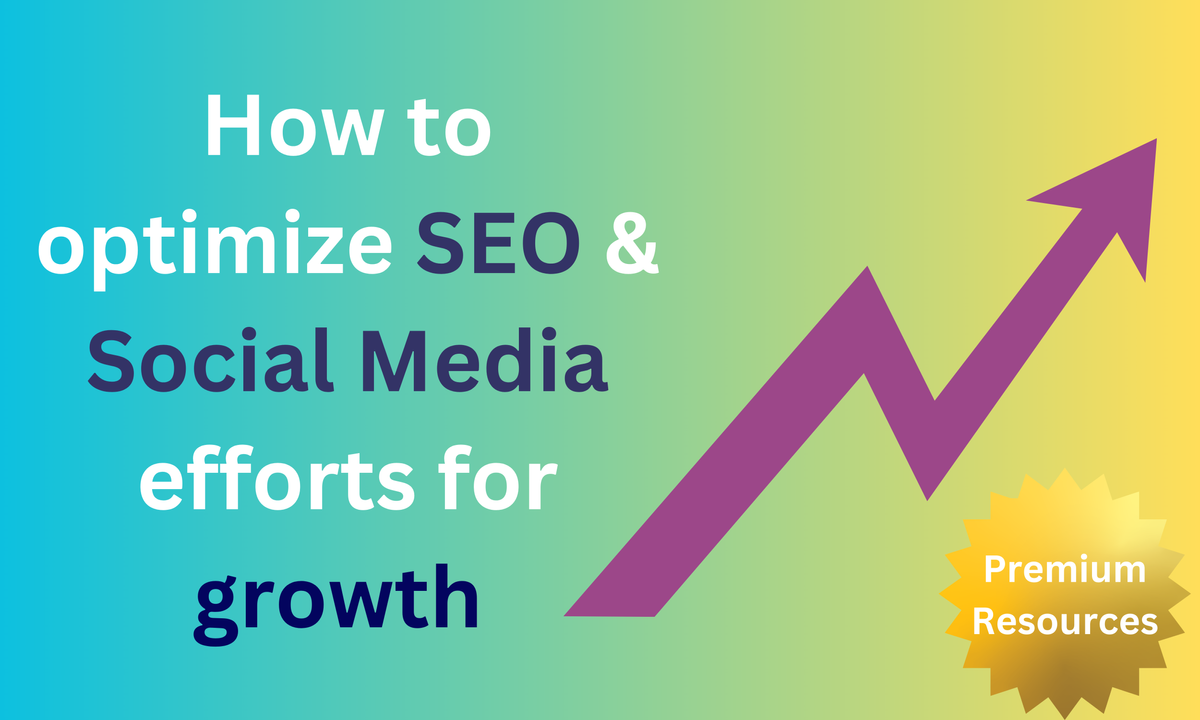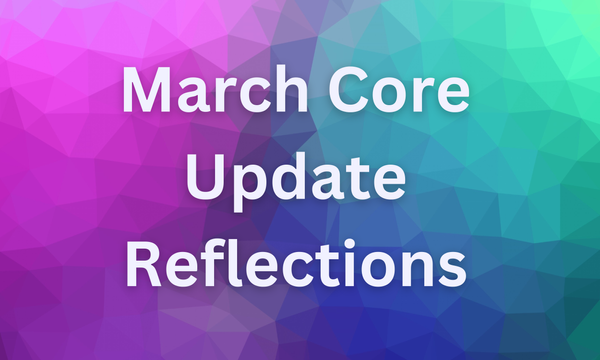Two Strategies, One Goal: How Social Media and SEO Build Your Brand Together
SEO and social media aren’t just good partners - they're a team for growing your brand’s reach, influence, and results. Learn how to drive growth.

SEO and social media: two different beasts, right? One bows to search engine algorithms, the other feeds off engagement highs. But it's important to know, they’re not just complementary; they’re downright inseparable if you want to dominate online.
Of course social media won’t directly hand you better search rankings on a silver platter. But it will indirectly amplify your efforts by driving traffic, boosting visibility, and snagging backlinks that make Google sit up and pay attention.
This article dives into the ways SEO and social media aren’t just good partners - they're a team for growing your brand’s reach, influence, and results. Let’s get to work.
How Social Media Supercharges Your Content
Social media isn’t just a platform for selfies and memes - it’s really useful for getting your content noticed, and yes, it can give your SEO a boost too. By sharing blog posts, videos, or resources on platforms like LinkedIn, Instagram, or Twitter, you’re expanding your reach, sparking conversations, and even planting the seeds for valuable backlinks.
Think about it: when you post a well-written article or a compelling video, there’s a chance an industry leader, journalist, or influencer might notice and share it. If they link back to your site in the process, that’s gold - also known as a natural backlink - which tells search engines your content is credible and worth ranking.
Beyond backlinks, social media helps you connect with niche communities who actually want what you’re offering. Whether it’s joining targeted groups, or getting Linkedin articles to rank alongside your own, you’re putting your content directly in front of the right audience. And when people engage, share, and discuss? That ripple effect means even more eyes on your work - and indirectly, a nod from search engines.
How Social Media Puts Your Content to Work:
- Boosts Visibility: Sharing on multiple platforms helps your content reach more people, fast.
- Earns Backlinks: Viral or widely shared content catches the attention of websites and influencers who link back to you.
- Engages Your Ideal Audience: Targeted groups and hashtags ensure the right people see and interact with your content.
- Increases Sharing Potential: Social media makes it easy for users to spread your content, multiplying its reach and impact.
Bottom line: social media isn’t just a content amplifier—it’s your backstage pass to better visibility, more engagement, and stronger SEO. Use it wisely, and watch your content work harder for you.
Increased Traffic to Your Website
Social media platforms are more than just places to connect—they’re direct pathways to your website, driving traffic and enhancing key SEO signals. While this traffic doesn’t directly affect search rankings, it plays a crucial role in proving to search engines that your content is relevant and valuable to users.
Every time your content gets shared on social media, it creates an opportunity for someone to click through to your site. This referral traffic can positively impact metrics like time spent on your site, the number of pages visited, and your bounce rate—user engagement signals that search engines use when evaluating your pages.
How Social Media Drives Website Traffic:
- Clickable Links: Sharing links to blog posts, product pages, or landing pages on platforms like Instagram (via bio or story links), Facebook, or LinkedIn encourages users to visit your website.
- Compelling CTAs: A clear call-to-action—like “Read the full guide,” “Check out the details,” or “Learn more on our site”—nudges users to take action and click.
- Promotions and Events: Announcing discounts, launches, or events on social media drives curious audiences to your website for more information.
- Content Teasers: Sharing key takeaways or highlights from your blog posts with a link to “read the full story” entices users to click for the bigger picture.
Why Website Traffic Matters for SEO:
- Engaged Visitors: Users who stay longer or explore multiple pages send a strong signal to search engines that your content is useful and engaging.
- Lower Bounce Rates: Visitors from social media who find value on your site are less likely to leave immediately, helping to reduce your bounce rate.
- Increased Branded Searches: Popular content shared on social media can lead to more people Googling your brand or content topics, boosting your search visibility.
Social media doesn’t just get your content seen—it drives quality traffic to your website. These engaged visitors help improve your site’s performance metrics, indirectly supporting your SEO efforts. By strategically using links, teasers, and clear CTAs on your social platforms, you can guide the right audience to your site and keep them exploring, all while strengthening your online presence.
Building Brand Awareness and Authority
A strong presence on social media does more than attract followers—it builds your brand’s reputation and authority, which are essential for long-term SEO success. When people recognize your brand as a trusted source, they are more likely to engage with your content, search for your business directly, and link to your website, all of which contribute to better search engine rankings.
Social media allows you to showcase your expertise, values, and unique voice in ways that resonate with your audience. By consistently sharing valuable content, you establish yourself as an authority in your industry, making it more likely for others to reference or link back to your website when they need credible sources.
How Social Media Builds Brand Authority:
- Thought Leadership: Sharing insights, tips, and opinions on platforms like LinkedIn or Twitter positions your brand as an expert in your field.
- Consistent Branding: A cohesive visual and messaging strategy across social media strengthens your brand identity, making it more memorable and trustworthy.
- User Trust: A strong social presence reassures potential customers that your business is credible, encouraging them to explore your website or recommend you to others.
- Community Engagement: Actively responding to comments, answering questions, and participating in discussions fosters a sense of connection, encouraging loyalty and organic promotion.
Indirect Benefits for SEO:
- Increased Branded Searches: A recognizable brand name leads to more people searching for your business directly, which search engines interpret as a sign of relevance.
- Higher Click-Through Rates (CTR): Users are more likely to click on a search result for a brand they recognize from social media, boosting your CTR and improving your rankings.
- Mentions and Links: Brand awareness leads to more people referencing your business in their content, generating natural backlinks and mentions that boost SEO authority.
Example in Action: A tech enthusiast with a strong Instagram presence might share tips, tutorials, and success stories, building a reputation as a go-to expert. Over time, this could lead to backlinks from tech blogs or even coverage in industry publications, all stemming from social media visibility.
Social Media Profiles in Search Results
Your social media profiles are more than just extras—they’re often front and center when users search for your brand. When optimized, these profiles can take up valuable real estate in search results, boosting your visibility and providing multiple touchpoints for users to connect with your business.
Search engines frequently display social media profiles alongside your website for brand-related searches. This added presence reinforces your credibility, helps build trust, and guides traffic back to both your website and social channels. In short, a strong social media presence makes your brand look well-rounded and accessible.
How Social Media Profiles Support SEO:
- SERP Real Estate: Platforms like LinkedIn, Instagram, and Facebook often rank highly in branded search results, giving users multiple ways to explore your brand.
- Credibility Boost: Consistent branding across your website and social media profiles reassures potential customers of your professionalism and legitimacy.
- Discovery Gateway: Many users prefer checking out brands on social media before visiting their websites. An optimized profile provides a clear and engaging entry point to your offerings.
Steps to Optimize Your Social Media Profiles for SEO:
- Use Consistent Branding: Align your profile name, handle, and bio with your website to create a cohesive identity.
- Include Keywords: Add relevant keywords in bios, about sections, or even your profile name (e.g., “Smith Consulting | Financial Services”).
- Add Website Links: Use bios, pinned posts, and highlights to link directly to your website or specific pages, driving traffic to your core platform.
- Stay Active: Regularly update and engage on your profiles to signal to both users and search engines that your brand is current and credible.
Indirect SEO Benefits:
- Stronger Brand Visibility: Occupying multiple spots in search results for your brand builds awareness and trust.
- Diversified Traffic: Social profiles generate extra visits to your website, indirectly improving user engagement metrics like click-through rates.
- Lead Funnel Entry Points: Active profiles with clear CTAs—like “Book a Consultation” or “Read the Blog”—encourage users to take action.
Example in Action:
Imagine a graphic designer optimizing their LinkedIn profile with a bio like: “Helping small businesses shine with custom branding and logos.” They include a link to their portfolio and post updates with tips on design trends. When someone searches their name, the LinkedIn profile ranks prominently, providing an easy gateway to their services and website
Optimized social media profiles aren’t just add-ons—they’re extensions of your brand that enhance your search presence. By maintaining active, well-branded profiles, you ensure that your social channels work seamlessly with your website, creating a cohesive, trustworthy, and discoverable online presence.
Social Signals and Engagement
Social signals—likes, shares, comments, and other forms of social engagement—may not directly impact search engine rankings, but their ripple effects can significantly enhance your SEO efforts. When your content resonates with your audience on social media, it leads to increased visibility, backlinks, and user interactions that search engines notice.
Every time someone engages with your content, they’re helping amplify its reach. More engagement means more people seeing, sharing, and discussing your work, which boosts brand recognition and attracts the kind of attention that can translate into traffic and links. Search engines might not measure likes or shares directly, but the downstream effects of engagement can make a real difference.
How Social Signals Indirectly Impact SEO:
- Content Validation: High engagement shows your content is valuable, making it more likely to earn links or references from others.
- Boosted Visibility: Social media algorithms favor engaging posts, giving your content more exposure to potential backlink sources.
- Encouraged Sharing: Shared content has a better chance of reaching influencers, bloggers, or publications that might link to it.
- Audience Insights: Posts with strong engagement can highlight the topics and formats your audience connects with most, shaping your SEO strategy.
Optimizing Social Media Engagement for SEO Benefits:
- Post Valuable Content: Share posts that educate, entertain, or address pain points to drive organic interaction.
- Encourage Interaction: Use questions, polls, and prompts in captions to spark conversations and shares.
- Leverage Hashtags: Target the right audience with relevant hashtags to increase your content’s discoverability.
- Add Visual Appeal: Eye-catching images, videos, and infographics are more likely to get shared, further boosting visibility.
Indirect SEO Benefits of Engagement:
- Increased Referral Traffic: Shares often lead to direct visits to your website, enhancing your traffic metrics.
- Brand Mentions: Widely shared content increases the chance of your brand being mentioned in blogs or forums, even without direct links.
- Enhanced Credibility: High social engagement reassures users that your content is relevant and trusted, encouraging further exploration of your site.
Example in Action:
A fitness coach posts a reel on Instagram showcasing a quick, effective workout. The post gains traction, resulting in shares within fitness communities, mentions in wellness blogs, and new traffic to their website. This leads to backlinks, brand mentions, and higher engagement—all of which indirectly support SEO.
Social signals might not directly influence rankings, but they’re powerful tools for amplifying your reach and driving the kind of engagement that strengthens your search performance. By creating content that sparks interaction and promoting it strategically, you can attract traffic, backlinks, and brand recognition that build your online authority.
Social Media Content as Evergreen Resources
Social media isn’t just about quick wins and instant engagement—it’s a goldmine for creating evergreen content that fuels your SEO strategy. By repurposing your most engaging posts into long-form resources, you can extend their lifespan and drive consistent traffic to your website. Even better, the data you gather from social media metrics helps you zero in on the topics and formats your audience already loves.
Evergreen content stays relevant over time, making it a cornerstone of SEO. Social media provides a live testing ground to identify what resonates, so you can refine those ideas into valuable resources for your blog or website.
How Social Media Supports Evergreen SEO Content:
- Content Testing: High-performing social posts reveal topics worth expanding into detailed blog posts or guides.
- Repurposing Opportunities: Turn popular social media posts into timeless formats like articles, eBooks, or videos for ongoing SEO benefits.
- Keyword Insights: Use the language and hashtags that drove engagement to sharpen your SEO keyword strategy.
- Audience Feedback: Questions and comments on social posts highlight exactly what your audience wants to learn more about.
Steps to Leverage Social Media Content for SEO:
- Identify High-Performing Posts: Use analytics to find posts with strong engagement, shares, or click-through rates.
- Expand Content: Transform these posts into evergreen resources like how-to guides, case studies, or in-depth articles.
- Optimize for Search: Incorporate the keywords and hashtags that resonated on social media into your expanded SEO content.
- Cross-Promote Content: Share your evergreen content back on social platforms to drive traffic and engagement from multiple channels.
Example in Action:
A fitness trainer shares a TikTok about the benefits of strength training for beginners, which gets strong engagement. They expand this into a comprehensive blog post optimized for the keyword “beginner strength training tips.” This blog post not only drives steady organic traffic but also becomes a resource they link back to in future TikToks and Instagram posts.
Social media is an untapped resource for generating and testing ideas that can become evergreen SEO powerhouses. By analyzing engagement, repurposing successful posts, and aligning them with your SEO strategy, you create a feedback loop where social content inspires search-worthy resources, and search content drives fresh traffic to your social channels. It’s a win-win for long-term visibility and engagement.
Strategies to Maximize SEO Benefits from Social Media
To unlock the full potential of social media and SEO working together, you need a clear, intentional strategy. When executed well, this approach drives traffic, earns backlinks, and builds brand visibility—all of which contribute to stronger SEO outcomes.
Here are practical strategies to align your social media efforts with your SEO goals:
1. Optimize Posts for Sharing
- Create content that’s easy to share, such as how-to guides, actionable tips, or striking visuals like infographics.
- Use captions with clear calls to action that encourage users to engage, share, or save your posts.
- Add social sharing buttons to your blog or website to make it effortless for readers to spread your content.
2. Integrate Keywords into Social Media Content
- Naturally incorporate SEO keywords into captions, bios, and hashtags to ensure your social posts align with search intent.
- Use keywords consistently across both your website and social posts to reinforce their relevance.
- Mix branded, niche-specific, and high-traffic hashtags to expand your reach and attract new audiences.
3. Leverage Visual Content
- Focus on visually engaging formats like videos, carousels, or infographics that are more likely to be shared and linked back to.
- Include captions or overlays with relevant keywords to tie visuals to your SEO objectives.
- Embed these visuals into blog posts or website pages, increasing their backlink potential.
4. Use Social Media Metrics to Inform SEO
- Track which posts drive the most traffic to your site and use those insights to refine your SEO content.
- Analyze referral traffic from different platforms and prioritize those with higher engagement rates.
- Look at audience questions and comments on social posts to uncover content gaps and create blog posts or guides to address them.
5. Encourage Backlink Opportunities
- Build relationships with influencers, bloggers, and industry peers to boost your chances of earning backlinks.
- Share your content in relevant groups or communities on LinkedIn, Facebook, or other niche platforms.
- Engage consistently with your audience to foster trust, increasing the likelihood of shares or mentions.
6. Cross-Promote Content Across Channels
- Share blog posts, guides, or other SEO-focused content on multiple platforms to increase exposure.
- Repurpose website content into bite-sized, social-friendly formats, such as TikTok videos, Instagram carousels, or Twitter threads, with links back to the full piece.
- Regularly feature evergreen content in posts or stories to keep it top of mind for your audience.
Key Takeaway:
Connecting social media and SEO with strategic intent amplifies their combined impact. By optimizing posts for sharing, weaving keywords into your social content, and using engagement data to guide your SEO strategy, you create a feedback loop: social media boosts your search visibility, and your SEO efforts drive social success.
Conclusion
Social media and SEO might seem like separate strategies, but they’re deeply connected and work better together. While social media doesn’t directly impact search rankings, its indirect benefits—like boosting content visibility, driving traffic, building authority, and encouraging backlinks—are essential for growing your online presence.
By recognizing how social media complements SEO, you can create a unified approach that amplifies the strengths of both. Share content that resonates with your audience, optimize your profiles for discoverability, and use social engagement to guide your SEO efforts. The more you align these channels, the more opportunities you’ll create for long-term growth.
Key Takeaway:
SEO and social media aren’t just complementary; they’re partners in building your brand. By strategically connecting them, you can attract more traffic, establish credibility, and expand your reach. Start bridging the gap today, and watch your brand thrive across search and social.
SEO & Social Media Synergy Template
Unlock the full potential of your social media and SEO strategy with our Social-SEO Synergy Diagnostic Template—exclusively available to Growth Accelerator subscribers. This template will help you:
- Identify top-performing content and amplify its reach.
- Pinpoint opportunities to optimize for search visibility.
- Streamline your workflow with actionable insights and tools.
Don't leave your content's success to chance—download the template today and take a giant leap toward measurable growth.




